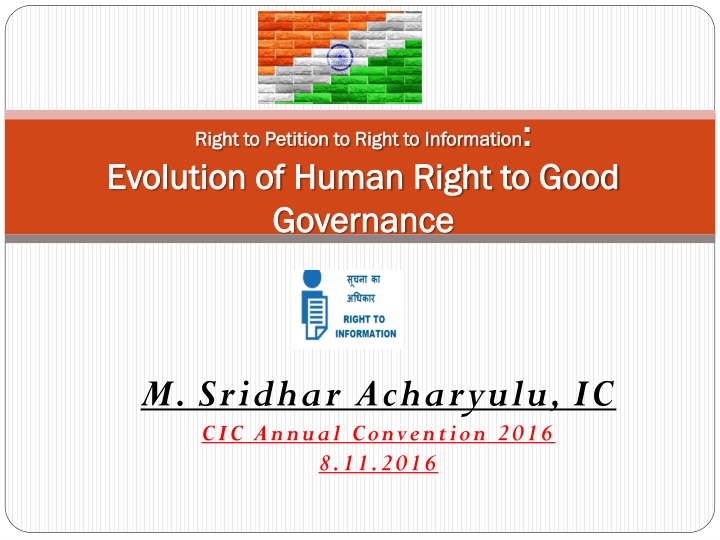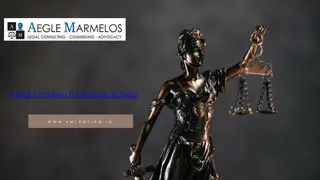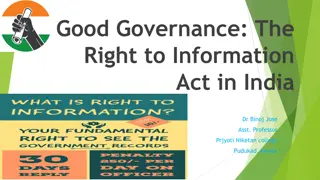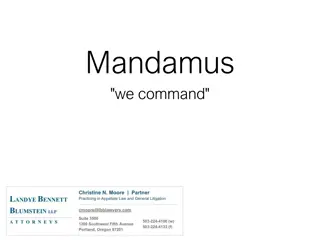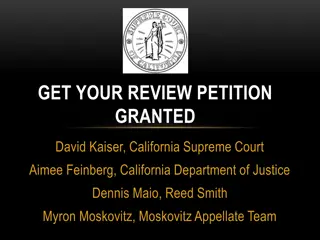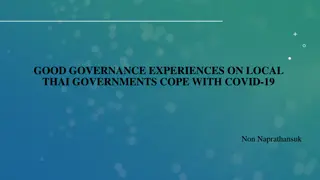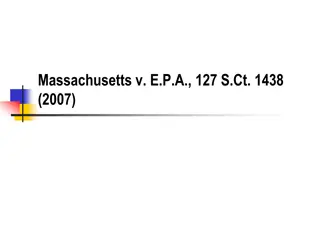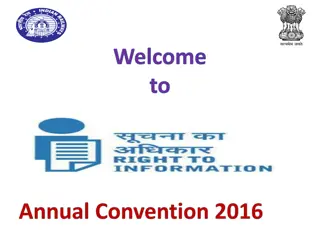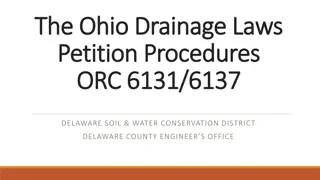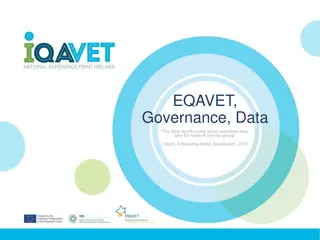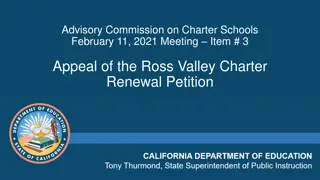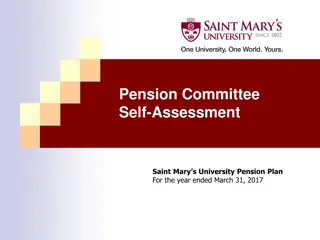Evolution of Human Right to Good Governance through Petition and Information
Explore the historical evolution of human rights focusing on the connection between the right to petition, right to information, and good governance. Delve into how the relationship between governors and the governed has changed over time, from the Magna Carta to modern times, highlighting the significance of questioning authority and demanding justice. Discover the roots of the right to petition in various historical documents and its relevance in contemporary societies.
Uploaded on Sep 14, 2024 | 5 Views
Download Presentation

Please find below an Image/Link to download the presentation.
The content on the website is provided AS IS for your information and personal use only. It may not be sold, licensed, or shared on other websites without obtaining consent from the author.If you encounter any issues during the download, it is possible that the publisher has removed the file from their server.
You are allowed to download the files provided on this website for personal or commercial use, subject to the condition that they are used lawfully. All files are the property of their respective owners.
The content on the website is provided AS IS for your information and personal use only. It may not be sold, licensed, or shared on other websites without obtaining consent from the author.
E N D
Presentation Transcript
Right to Petition to Right to Information: : Right to Petition to Right to Information Evolution of Human Right to Good Evolution of Human Right to Good Governance Governance M. Sridhar Acharyulu, IC CIC Annual Convention 2016 8.11.2016
Governors & Governed: Changing relationship Magna Carta 800 years ago and the RTI a decade ago drastically changed relationship between the citizens and the government. Only three clauses of the 1225 Magna Carta remain on the statute book today. 1. The liberties and rights of the English Church, 2. The liberties and customs of London and other towns, 3. The third is the most famous: No free man shall be seized or imprisoned, or stripped of his rights or possessions, or outlawed or exiled, or deprived of his standing in any other way, nor will we proceed with force against him, or send others to do so, except by the lawful judgment of his equals or by the law of the land. To no one will we sell, to no one deny or delay right or justice.
Problem of Ego of Rulers and Need to question/ask/say Rulers equated petitioning with questioning, or challenging the authority of Emperor. Kings considered it as seditious libel. It s a complaint against the royal rule. They looked down the seeker of something. The people should take whatever is given, should not ask. Right to demand was unimaginable in dictatorship regimes world over.
Tracing the right The Article 44 of the Charter of Fundamental Rights of the European Union ensures the right to petition to the European Parliament. This right can be traced back to the Magna Carta (1215), the Petition of Right (1628), the Basic Law for the Federal Republic of Germany, the Bill of Rights 1689, and the UNDHR in 1948 followed by the listed Fundamental Rights in Indian Constitution.
Fight for Rights: First Right is... Fight for Rights: First Right is... Right to Petition in Clause 61, Magna Carta 1250 AD The Magna Carta, Chapter 61 says. the peace and liberties we have granted and confirmed to them by this our present Charter, so that if we or any one of our officers shall in anything be at fault towards anyone,or shall have broken any one of the articles of this peace or of this security, and the offence be notified to four barons of the foresaid five and twenty, the said four barons shall repair to us and, laying the transgression before us, petition to have the transgression redressed without delay.. .
Redressal Redressal in 40 days is ancient right in 40 days is ancient right Right to Redressal within 40 days: It provided time of 40 days for redressal, i.e., right to redressal is also given And if we have not corrected the transgression [ ] within forty days, reckoning from the time that it has been intimated to us [ ] the four barons aforesaid shall refer the matter to the rest of the five and twenty barons Right to rebel: It will be totally unimaginable that the consequences include even right to rebel, if grievance is not redressed, it says: and those five and twenty barons shall together with the community of the whole realm disdain and distress us in all possible ways, namely by seizing our castles, lands, possessions and in any other way they can until redress has been obtained as they deem fit, saving harmless our own person, and the persons of our queen and children; and when redress has been obtained, they shall resume their old relations toward us
Consequential rights to "right to petition Right to information Right to consideration of such petition Right against prosecution for petition Right to transparency Right to lobby Right to response Right to rebel
Supplementary Rights Right to redressal of grievances Right to services Right to dissent Right to freedom of speech and expression Right to remedy: (to file PIL, Articles 226 and 32 of Constitution) Right to compensation Right to sue the government
To ask, a Crime? To ask, a Crime? Questioning or criticizing or even embarrassing the government was a crime. England has created a crime seditious libel 17th Century: ...communicating words, pictures, or signs that defamed, discredited, criticized, embarrassed, or questioned the government, its policies, or its officials. Filing a petition was considered as seditious libel. Not only that a citizen does not have a right to submit a petition but that also was a crime against state Both libel and sedition are British appendages, which British got rid off, but India did not.
Protection for asking 1. English Bill of Rights of 1689 says: That it is the right of the subjects to petition the king,and all commitments and prosecutions for such petitioning are illegal 2. Right to consideration of the petition After removing criminal consequences, right to petition needs to have a positive consequence. Right to petition is fine, but what to do if that was not even considered? Over a period of time right to consideration of that petition has also emerged along with the right to petition.
American Declaration of Independence The Declaration of Independence listed 27 grievances against King George and others . The Declaration detailed the colonists petitions and the King s response: In every stage of these Oppressions, we have petitioned for Redress in the most humble terms: Our repeated Petitions have been answered only by repeated injury. The Magna Carta outlined the response when Petitions for Redress were ignored. This also includes about rebellion. The Right to Rebellion defined in 1215 was exercised in 1776 and explained in the Declaration.
Right to response This was the history in America as the First Amendment was drafted. The Right to Petition inherently includes the Right to a Response, and a government failure to respond triggers a Right to Rebellion. Till now, unfortunately the Right to Petition remained the least known and certainly least understood guarantee of the Bill of Rights. The right to petition government for redress of grievances is the right to make a complaint to, or seek the assistance of one's government, without fear of punishment or reprisals is also recognized in Europe.
The First Amendment Right First Amendment of the Bill of Rights (USA) has five rights. The limits on government interference with religion, speech and the press took shape of first amendment rights. The right to peaceable assembly was a needed protection to exercise these first three. The Right to Petition was central to constitutional law and politics in the early United States: Congress shall make no law abridging the right of the people to petition the Government for a redress of grievances.
The scope of petition right The Petition Clause use of the term government acknowledges an individual s right to invoke government s powers by way of a petition for redress of grievances. The clause thus affirms the right to invoke the government s judicial power by petition for redress. With the Petition Clause comes a right to petition the judicial branch for redress of grievances against the government. The Petition Clause created a constitutional right.
Right to sue the Government Whenever a citizen sued government for remedy or compensation, he was stonewalled with the argument of sovereign immunity or maxim of king can do no wrong . Instead of this right, "sovereign immunity" was the rule for a long time, as it was thought that the government can only be sued according to its consent. Such immunity abridges the right to redress grievances with government and freedom of citizen to question etc. King is liable, not immune! Kasthurilal case to C Ramachandra Reddy case Right to compensation emerged out of this.
Right to effective remedy The Universal Declaration, Art. 8, states the essence of our Petition Clause, as to all governments: Everyone has the right to an effective remedy by the competent national tribunals for acts violating the fundamental rights granted him by constitution or by law. There should be easy processes and less costing mechanisms to secure justice/remedy. Complexity of procedure, pendency of litigation, procrastination for decades kill the right to remedy.
Make law to create remedy The International CovenantArticle II, 2 and 3 declares: 2. Where not already provided for by existing legislative or other measures, each State party to the present Covenant undertakes to take the necessary steps, in accordance with its constitutional processes and with the provisions of the present Covenant, to adopt such legislative or other measures as may be necessary to give effect to the rights recognized in the present Covenant. The PIL emerged as judicial creation/extension of right to petition.
Develop judicial remedy 3. Each State Party to the present Covenant undertakes: (a) To ensure that any person whose rights or freedoms as herein recognized are violated shall have an effective remedy, notwithstanding the violation has been committed by persons acting in an official capacity. (b) To ensure that any person claiming such a remedy shall have his right thereto determined by competent judicial, administrative or legislative authorities, or by any other competent authority provided for by the legal system of the State, and to develop the possibilities of judicial remedy; Lonergan v. United States, 303 U.S. 33 (1938).
The bitter PIL against state Constitution of India provided right to remedy as a fundamental right. A citizen whose fundamental right is violated, can straight away go to state High Court or Supreme Court of India seeking remedy in the form of a writ, a direction or order to the public authority. However, locus standi was an essential requirement for seeking remedy, i.e., only the victim of rights should seek remedy. If victim is poor or unreachable because of distance, or if dead, the wrongdoer s liability is automatically removed. If the state is wrongdoer, none could question it. From this situation emerged the judicial activism and Public Interest Litigation. Article 226 of Indian Constitution Article 32 of Indian Constitution. Locus standi is a legal principle which insists only victim should approach the court for remedy, which was relaxed by PIL.
Freedom of speech Right to freedom of expression Right to petition is important even today during these modern days of democratic rule of law. It is part of freedom of speech and expression guaranteed by First Amendment to US Constitution and under Article 19 of Indian Constitution. In the petition , a citizen freely expresses his views and criticises the policy as unconstitutional . Right to petition emanates from this basic right and also reflect it when used.
Right to dissent The writ petitions or PILs before Judiciary or ordinary petition before Government bodies reflects the dissent, dissatisfaction or criticism of the policies or decisions taken up by the Government. Right to petition embraces the right to express dissent since it reflects the spirit of liberty. It cannot be denied and its denial will be considered as degradation. Scientific temper, critical analysis and questioning is needed in a civilized society. Constitution prescribed it as a Fundamental Duty.
Lobbying: Right or Problem? Right to lobby: In American society there are ongoing conflicts between organizations that wish to impose greater restrictions on citizen's attempts to influence or "lobby" policymakers, and groups that argue that such restrictions infringe on the constitutionally protected right to sue the government and the right of individuals, groups, and corporations (via corporate personhood), to lobby the government.
Right to transparency Another controversial US draft law is being considered. Proposed Executive Branch Reform Act, require over 8,000 Executive Branch officials to report into a public database nearly any "significant contact" from any "private party", a term that the bill defines to include almost all persons other than government officials. The bill is supported by some organizations as an expansion of "government in the sunshine", but other groups oppose it as an infringing on the right to petition by making it impossible for citizens to communicate their views on controversial issues to government officials without those communications becoming a matter of public record.
Right to services The Citizens charters are supposed to be declarations of public authority to serve the taxpaying citizen. The governors owe a duty to serve them. Something like issuing caste certificate or certifying income or giving permission to build a house as per building bylaws, etc. Charter should declare time-bound delivery of services to the citizen. Though right to petition the government for redress of grievances is a significant right, but this right did not become statutory right as the Governments are still hesitating to provide. Right to Service legislation, which are supposed to reduce corruption among the government officials and increase transparency and public accountability.
Right to service Madhya Pradesh enacted Right to Service Act on 18 August 2010 and Bihar was the second to enact this bill on 25 July 2011.Several other states Bihar,Delhi,Punjab,Rajasthan,Himachal Pradesh Kerala, Uttarakhand, Haryana,Uttar Pradesh, and Jharkhand have introduced similar legislation for effectuating the right to service to the citizen.
Right to redressal Without any system of redressal of grievance either of employees or of the citizen, the state cannot boast of governance, let alone good governance . The political leadership and the bureaucracy under the guidance of political governors have almost forgotten the obligation of offering governance to the people who are paying taxes and cast their vote to rule them. In the days of no governance or bad governance, information is important tool for a citizen. Informed citizen alone could be a vibrant citizen, without whom there cannot be any purposeful democracy.
Redressal right: Good governance Every civilized, so called, country should have open and fluid systems by which all grievances with government, real or imagined, can freely be addressed and justly redressed. Every government in all of its functions should be accountable to the governed in every way that it may create grievances with them, and that means that no government functionary can have immunity from just redress of grievances with it.
Finally, Right to Information... In addition to several auxiliary rights to right to petition as explained above, right to information is added as a significant necessity of civilized society. Right to information is basic to any democracy. A vibrant citizenry is a pre-requisite for survival of democratic society and good governance. It is not possible to have a rightful expression as a right without the right to information which is basis to freedom of speech.
Fight against secrecy, for accountability A citizen cannot afford to reconcile to the strong trend that government might run only on secrecy and human right is only a dream. It is not possible for any democratic Government to survive without accountability, which can be realized only when the people have information about the functioning of the Government. The whole effort must be to make democracy a really effective participatory democracy. The representative rulers should allow the real sovereigns, i.e., the people to decide, and the people have to decide or take part in every decision making process.
Right To Information about Govt. Functioning of Government Quality of life in a civilized society depends upon the quality of exchange of information about governance and related aspects. It is not possible for any democratic Government to survive without accountability, which can be realized only when the people have information about the functioning of the Government.
Freedom of Information The United Nations General Assembly (UNGA), in its every first session in 1946, adopted Resolution 59(1), which states: Freedom of information is a fundamental human right and . the touchstone of all the freedoms to which the United Nations (UN) is consecrated.
Right against corruption Article 13 of the "UN Convention against Corruption" 2003, identifies: (i) effective access to information for public (ii) undertaking public information activities contributing to non-tolerance of corruption (including conducting public education programmes) and (iii) respecting, promoting and protecting the freedom to seek, receive, publish and disseminate information concerning corruption ' as important measures to be taken by Government for ensuring the participation of society in governance'. Article 10 of the UN Convention against Corruption states: to combat corruption, each (member State) shall, in accordance with the fundamental principles of its domestic law, take such measures as may be necessary to enhance transparency in its public administration, including with regard to its organisation, functioning and decision-making processes and take (certain) measures (for adopting procedures/regulations, simplifying administrative procedures and publishing information )
Right to information about candidates In Union of India v. Association for Democratic Reforms' Case (2002) 5 Supreme Court Cases 294 The right to information of the voter/citizen is sought to be enforced against an individual who intends to become a public figure and the information relates to his personal matters. Secondly, that right cannot materialize without State's intervention. The State or its instrumentality has to compel a subject to make the information available to public, by means of legislation or orders having the force of law.
RTI an added value to Right to petition In the days of no governance or bad governance, information is important tool for a citizen. Informed citizen alone could be a vibrant citizen,without whom there cannot be any purposeful democracy.
Principle of Maximum Disclosure Section 4 of RTI Act Embodies the principle of maximum disclosure,i.e.If disclosure is properly followed,the need for seeking information under RTI would not arise. Illustrative Disclosure should be : Exhaustive Unambiguous
Other important laws.. Without implementing the Acts, such as Public Records Act 1993 Whistle Blowers Protection Act, 2014 LokpalAct Redressal Grievances or Service Act, It is impossible to bring change with only RTI Act!
Problem of maintenance of files All these rights, even after got consolidated into statutory rights will not be effective without proper maintenance of records and files, without raising excuse of files not traceable. THANKS for your attention
